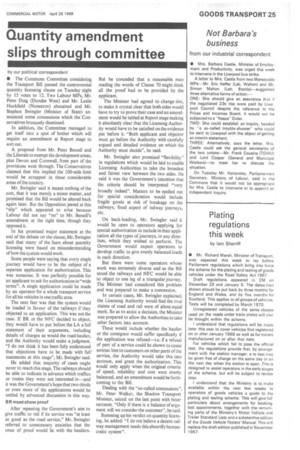Quantity amendment slips through committee
Page 27

If you've noticed an error in this article please click here to report it so we can fix it.
by our political correspondent
• The Commons Committee considering the Transport Bill passed the controversial quantity licensing clause on Tuesday night by 15 votes to 12. Two Labour .MPs, Mr. Peter Doig (Dundee West) and Mr. Leslie Huckfield (Nuneaton) abstained and Mr. Stephen Swingler (Minister of State) announced some concessions which the Conservatives brusquely dismissed.
In addition, the Committee managed to get itself into a spot of bother which will require an amendment at Report stage to sort out.
A proposal from Mr. Peter Besse11 and the Liberals to exempt the development areas, plus Devon and Cornwall, from part of the provisions went through. The Conservatives claimed that this implied the 100-mile limit would be scrapped in these considerable areas of the country.
Mr. Swingler said it meant nothing of the sort, that it was merely a minor matter, and promised that the Bill would be altered back again later. But the Opposition jeered at this "slip" which appeared to arise because Labour did not say "no" to Mr. Bessell's amendment at the right time, though they opposed it.
In his promised major statement at the end of the debate on the clause, Mr. Swingler said that many of the fears about quantity licensing were based on misunderstanding of how the system would work.
Some people were saying that every single journey would have to be the subject of a separate application for authorization. This was nonsense. It was perfectly possible for an applicant to ask for authorization in"wide terms". A single application could be made by an operator for a whole transport service for all his vehicles in one traffic area.
The next fear was that the system would be loaded in favour of the railways if they objected to an application. This was not the case. If BR or the NFC decided to object, they would have to put before the LA a full statement of their arguments, including details of charges as would the road haulier, and the Authority would make a judgment. "I do not think it has been fully understood that objections have to be made with full' statements at this stage", Mr. Swingler said. He added that majority of cases ought never to reach this stage. The railways should be able to indicate in advance which traffics or routes they were not interested in—and it was the Government's hope that two-thirds or even more of the applications would be settled by advanced discussion in this way.
BR must show proof
After' repeating the Government's aim to give traffic to rail if its service was "at least as good as the road service," Mr. Swingler referred to unnecessary anxieties that the onus of proof would lie with the hauliers. But he conceded that a reasonable man reading the words of Clause 70 might think all the proof had to be provided by the applicant.
The Minister had agreed to change this, to make it crystal clear that both sides would have to try to prove their case and an amendment would be tabled at Report stage making it absolutely clear that the Licensing Authority would have to be satisfied on the evidence put before it. "Both applicant and objector must go before the Authority with carefully argued and detailed evidence on which the Authority must decide", he said.
Mr. Swingler also promised "flexibility" in regulations which would be laid to enable Licensing Authorities to take the broadest and fairest view between the two sides. He said it was the Government's intention that the criteria should be interpreted "very broadly indeed". Matters to be spelled out for special consideration would include fragile goods at risk of breakage on the railways, fixed aspect of railway journeys, etc.
On back-loading, Mr. Swingler said it would be open to operators applying for special authorization to include in their application all the types of journeys, in any direction, which they wished to perform. The Government would expect operators to develop traffic to give evenly balanced loads in each direction.
But there were some operators whose work was extremely diverse and as the Bill stood the railways and NFC would be able to object to one leg of a triangular journey. The Minister had considered this problem and was prepared to make a concession.
In certain cases, Mr. Swingler explained, the Licensing Authority would find the rival claims of road and rail were of about equal merit. So as to assist a decision, the Minister was prepared to allow the Authorities to take other factors into account.
These would include whether the haulier or the consignor would suffer specifically if the application was refused—i.e. if a refusal of part of a service could be shown to cause serious loss to customers on other parts of the service, the Authority would take this into account, and grant the authorization. This would only apply when the original criteria of speed, reliability and cost were evenly balanced, and an amendment would be forthcoming to the Bill.
Dealing with the "so-called concessions", Mr. Peter Walker, the Shadow Transport Minister, seized on the last point with bitter sarcasm. "Only if there is a balance of argument will we consider the customer", he said.
Summing up his verdict on quantity licensing, he added: "I do not believe a decent railway management needs this absurdly bureaucratic system".




















































































































